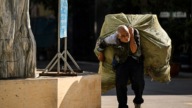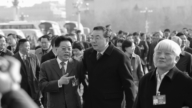【新唐人2012年10月20日讯】根据中共当局的数据显示,2011年11月底,“扶贫工作会议”确定以农民“人均年纯收入2300元”作为全中国新的“扶贫标准”,也就是“人均日纯收入6.3元”。而中国还有1亿2千8百万人生活在贫困线下,到底这6.3元如何过一天?对比中共官员每年的公款吃喝开销高达3000亿,有网友留言(@Habiba77):“6.3元纯过一天基本不太可能,水电油汽都是钱。不过饥饿一天倒是可以参与的。”接下来,就来听听中国底层人民体验贫困生活的真实情况:
数据显示,中国还有1亿2千8百万的贫困人口,占大陆总人口数近十分之一。而中国新的扶贫标准,去年年末当局以农民“人均年纯收入2300元”作为标准,按照一年365天计算,中国有近1亿3百万人每天人均纯收入约6.3元。
中国的“扶贫基金会”为了响应“联合国世界粮食计划署”的号召,在“国际消除贫困日”当天呼吁民众参与一天仅花费“六元三角”的贫困生活体验。
上海商人谢丹表示,“6块3毛”坐三次公车就没了,更不用谈吃饭穿衣的生活基本开销,尤其是对那些在城市打工的农民工来讲更是不可能。
上海商人谢丹:“其实到城里来打工,这个待遇也相当的低,生活水平与原本城市里面的居民根本不能相比,因为待遇不一样,真正在农村务农的根本就没有基本劳动收入,绝大部分只是图个温饱、然后子女的教育、生老病死的社会保障,根本就谈不上。”
宁夏银川张永宁:“现在菜价上涨,粮食也上涨,6块3毛钱根本不够,别的什么都不算,像冬天买煤、缴电费什么都不算,这一个月很节俭我还得花5百块钱,咱们说你上街吃碗面,吃碗面还得10块钱,除此之外,就是别的都不要干,你说出去玩,上哪走走,开门就是钱,你就最好别出去。”
根据中共当局发布的2011年《中国薪酬发展报告》数据显示,中共高官年薪相当于农民工平均工资的4000多倍,明显对比出贫富差距的悬殊。
江西网友刘女士表示,贫富差距造成的社会不公,6块钱根本无法图温饱,而造成收入差距的原因,主要有国企资源的垄断和贪官腐败的乱象,跟那些贪官腐败的金额比起来,访民生活简直是人间炼狱。
江西网友刘女士:“因为人大代表本身就是代表利益集团,这就是国家直接导致贫富(差距)是有很大原因的,我们没有人权、没有自由、没有法治,法治已经死亡了,只有人治和权治,因为是特色国家,肯定是不奇怪,一天6块多钱是不奇怪的。”
北京访民贾女士:“6块3毛钱对访民来讲,一天生活都不够,在访民身上一天最低也要10块钱。”
另外,与“6.3元过一天”相对应的,是大陆餐桌上的惊人浪费。“中国农业大学食品科学与营养工程学院”调查的数据,大陆一年仅餐饮浪费的蛋白质和脂肪,就高达800万吨和300万吨,相当于倒掉了两亿人一年的口粮。
据了解,中共官员一年公款吃喝的开销高达3000亿,从各大酒店的馊水桶里的“丰盛”菜肴,以及中国“地沟油”的猖獗,就可以知道浪费的程度有多可怕,这区区的6.3元对这些阔绰的官员们来讲,连小费都不够。
采访/朱智善 编辑/黄亿美 后制/郭敬
Three Hundred Billion RMB for Corrupt Officials’ Food Expenses and 6.3 RMB Per Day for the Poor
The Chinese authorities’ data shows that during the so-called
anti-poverty work meeting at the end of November 2011,
it was determined that a farmer’s per capita net income
of 2,300 yuan annually became a new poverty line.
That is 6.3 yuan ($1 USD) per day per capita net income.
China has 128 million people living under the poverty line.
How do they spend 6.3 yuan a day?
Some netizens said, “It is impossible to live with 6.3 yuan
a day since water, electricity, and gas all take money too.
However, one can go hungry for one day.”
Let’s hear how the lower social level of Chinese talks
about their real hardship in life.
The data shows that 128 million Chinese, which accounts
for nearly one-tenth of the total population of Mainland,
fall into the poor population.
The new poverty standards follow the farmers’ per capita net
income of 2,300 yuan as a standard since the end of last year.
When divided by 365 days a year, it can be seen that nearly
103 million people in China have only 6.3 yuan to spend every day.
In response to the call from the United Nations World Food
Programme (WFP), the International Day for the Eradication of Poverty,
sponsored by the China Foundation for Poverty Alleviation,
called on people to participate in a poverty experience by spending only $6.30 yuan for a day.
Shanghai businessman Xie Dan commented that without
factoring in living expenses, three bus rides cost 6.3 yuan,
and it would be impossible to live off that amount,
particularly for peasants coming to work as laborers in the city.
Shanghai businessman Xie Dan: “In fact, this is quite low,
even for those coming to work in the city.
You cannot compare their living standard with that
of the original residents of the city.
People who are from the rural area have no basic labor income.
Most of them just want to have three meals a day.
They cannot afford to think about the education of their children
and the social security for birth, age, illnesses and death.”
Zhang Yongling from Ningxia, Yinchuan, “The price
of everything is rising. 6.3 yuan is far from enough.
Not including utilities, 500 yuan a month
will barely cut it even with thrifty spending.
Just a bowl of noodles costs 10 yuan.
Besides, one cannot go anywhere.
If you go anywhere, you need to spend money.
You are better off staying home.”
According to the 2011 salary Development Report
published by the authorities,
a CCP senior official’s annual salary is equivalent to
4,000 times the average wage of peasant workers.
There is a sharp contrast between the rich and the poor.
Jiangxi netizen Ms Liu said that the gap between the rich
and the poor has created social injustice.
Six yuan is not enough to feed oneself.
The income gap results mainly from the monopoly
of state-owned resources and corruption.
Compared with the lives of corrupt officials,
petitioners’ lives are simply hell on earth.
Jiangxi netizen Ms. Liu: “The deputies of the People’s
Congress represent the interest group,
which is the primary cause of the gap between
the rich and poor. We have no human rights, no freedom.
The rule of law has died, only the rule of man and
the right to rule exist.
Because this is a special country, it is certainly not
surprising that six yuan for one day is not strange."
Ms. Jia, petitioner in Beijing: “6.3 yuan is not even enough
for a petitioner to live for one day. It is at least 10 yuan for a petitioner.”
In contrast to 6.3 yuan per day, Food Science and Nutritional
Engineering of China Agricultural University survey data shows shocking waste on dining tables.
It is learned that in Mainland the protein and fat waste reaches
as much as 8 million tons and 3 million tons a year, enough food to feed two hundred million people for one year.
It is understood that the CCP officials spend public funds
of up to 300 billion yuan on food and drink.
From the rich dishes in trash cans of the major hotels
and the prevalence of ditch oil, the extent of the terrible waste can be easily imagined.
A measly 6.3 yuan is nothing for these officials,
not even enough for a tip.




























